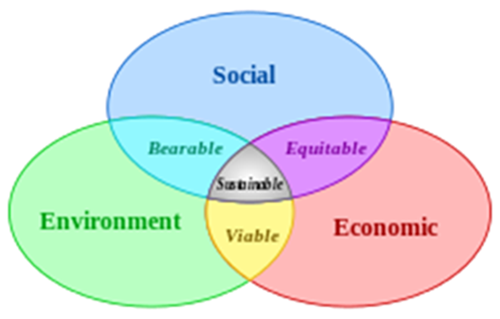The Triangle of Sustainable Development: The Economy, Energy & the Environment
Sustainability is the practice of maintaining processes of productivity indefinitely—natural or human made—by replacing resources used with resources of equal or greater value without degrading or endangering natural biotic systems. Sustainable development binds together concern for the natural systems with the social, political, and economic challenges faced by humanity.
The three pillars of sustainable development are the economy, energy and the environment. Interaction between these three pillars sustains a growing global economy which provides employment for millions of people and a decent standard of living in a healthy environment and the energy means that help enhance the quality of our life and mobility. The global economy has to be in a continuous state of healthy growth if it is to be able to feed 7.5 billion of people.

Modern economies endeavour to reconcile ambitious economic development with obligations of preserving the natural resources and ecosystem, the two are traditionally seen as of conflicting nature. As countries around the world continue to advance economically, they put a strain on the ability of the natural environment to absorb the high level of pollutants that are created as a part of this economic growth. Therefore, solutions need to be found so that the economies of the world can continue to grow, but not at the expense of the environment. That is why human society should always seek efficiency and look for feasible substitutes over time.
The future is green
Sustainable energy is clean and can be used over a long period of time. Unlike fossil fuels and biofuels that provide the bulk of the world’s energy, renewable energy sources like hydroelectric, solar and wind energy produce far less pollution. As renewable energy becomes more common, fossil fuel infrastructures are replaced by renewables, providing better social equity to communities. Overall, and in the long run, sustainable development in the field of energy is also deemed to contribute to economic sustainability and national security of communities.
Environmental sustainability concerns the natural environment and how it endures and remains diverse and productive.
One of the core concepts in sustainable development is that technology can be used to assist people meet their developmental needs.
Transportation for instance is a large contributor to greenhouse gas emissions. However, sustainable transport has many social and economic benefits that can accelerate local sustainable development.
A growing penetration of the transport system by electric vehicles (EVs) will eventually help reduce the demand for oil.
More than a decade ago, China overtook the U.S. as the world's biggest carbon dioxide emitter. Today, it’s going for a complete 360 with a hungry drive to beat the United States at the renewable energy game. China is now the largest investor in solar energy accounting for nearly half of the world’s new renewable energy investment of $279.8 billion according to Bloomberg New Energy Finance.
China is fast-tracking the country’s first solar highway. The plastic-covered solar panels cover a portion of highway that is two-thirds of a mile long and is close to an electricity substation, so it can be hooked up to the grid easily.
The game is on, and the winner will be the one willing to invest in projects, even when it’s not immediately economically viable.
*Dr Mamdouh G. Salameh is an international oil economist. He is one of the world’s leading experts on oil. He is also a visiting professor of energy economics at the ESCP Business School in London.
The views and opinions expressed in this article are those of the author and do not necessarily reflect the position of ESCP Business School.
Interested in becoming an energy expert and make a real impact in the industry? Check out how ESCP's programmes will equip you with the tools you'll need!









 Facebook
Facebook Linkedin
Linkedin Instagram
Instagram Youtube
Youtube EMC Newsletter
EMC Newsletter







